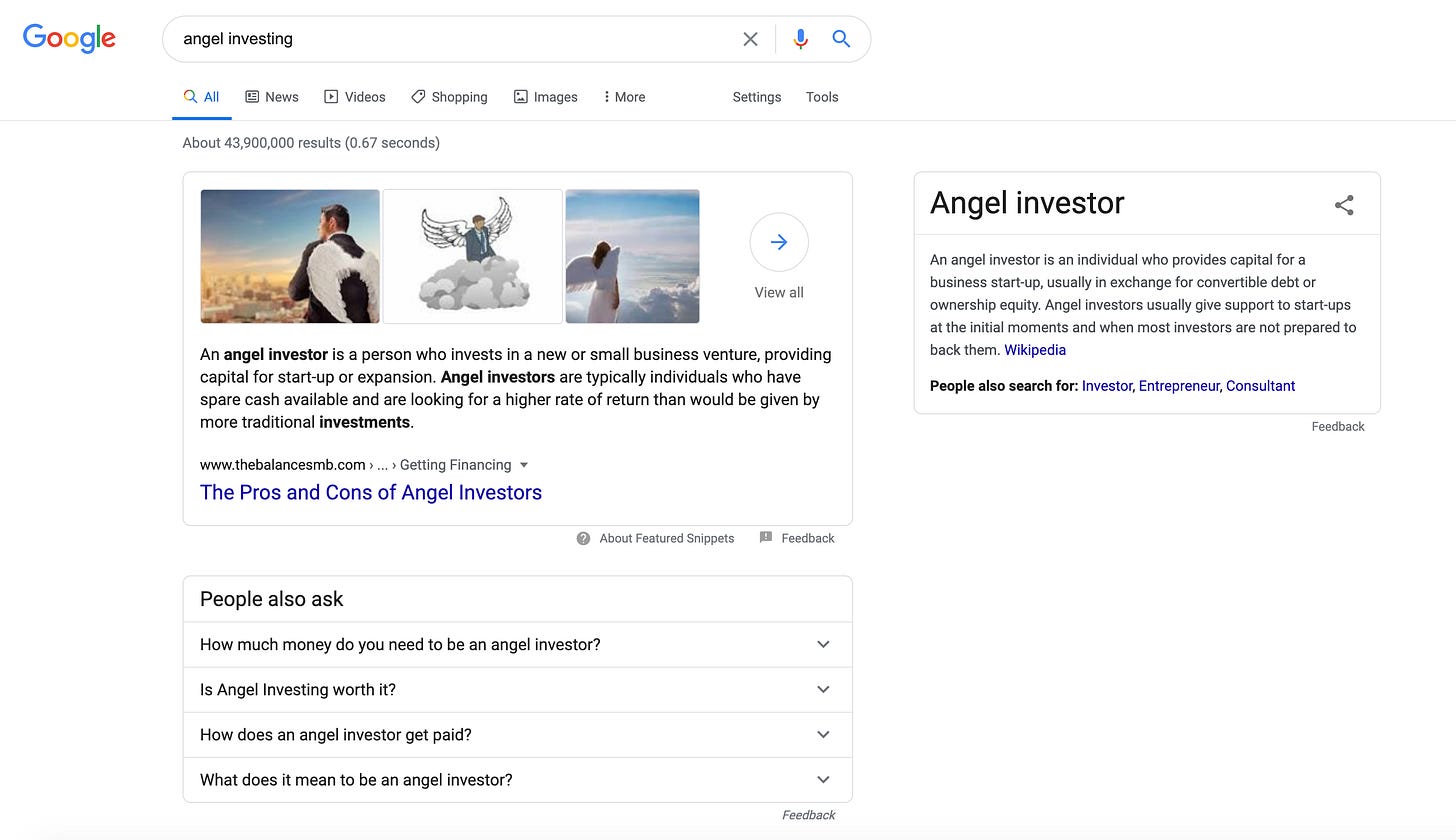🙌 Welcome to the first edition of All The Angels!
⛳️ First of all, thank you for exploring this space. This is my first newsletter and I’m excited to share my thoughts and give you a peak into how angel investors think.
🖌 I’ll aim to publish an interview once a month with an angel investor to give a glimpse of the day in the life and some tips for how to get started in angel investing.
🗝 To get us started, I wanted to share more context of where you’ve landed and what you’ll learn from this newsletter.
🤔 What is this newsletter about?
I’m writing this newsletter to provide everyone an equal opportunity to learn directly from angel investors who have been doing this for a while, who can show you what the day-to-day looks like and share advice on how to get started.
When searching up “angel investing” on Google, you won’t find a lot of information. There are a couple of sponsored ads for angel investing camps, some angel networks and a barebone definition of what angel investing is. To me, it seemed like a black box. It’s daunting for a first time angel investor who has little understanding of investing how or where to get started.
The industry is really opaque and unfortunately, the best way to learn more about angel investing is if you already know someone who is angel investing. I want to change this and give you easier access to the mindset of angel investors: what they look for when evaluating start-ups, how they first started investing, how they support start-ups they invested in.
In addition, most well-known angel investors that you might have heard of: Ron Conway, Jason Calacanis, Ryan Graves, etc. They all have amazing successes and have supported companies that everyone has heard of but they also all look… similar. I want to show you that there are diverse angel investors who are based all over the US.
😇 What is angel investing?
When investing your assets (aka your wealth 💵), people invest differently depending on their risk appetite: some people keep everything in their savings account, some people invest in the stock market and others buy a house and invest in real estate.
Angel investing is when an individual invests specifically in the venture asset class. They invest some of their assets in buying equity of a start-up.
Angel investing is mainly for those with a higher risk appetite, but if you decide to do it, it can be really rewarding:
You’re supporting entrepreneurs at the beginning of their journey, giving them capital when they need it the most
You’ll meet interesting people: angel investors come from all backgrounds but they’re all really fascinating people
You’ll understand and predict industry trends: if you decide to focus on a specific sector, you’ll see what innovations entrepreneurs are building and get an idea where the industry is trending
I think it’s important to note that “increasing your wealth” is not listed as a reason to angel invest. Investing in a start-up is extremely risky. According to Forbes, 90% of start-ups fail. If you do invest in a successful start-up, you also won’t see the return until 7-10 years after their initial fundraising. So this is also a very illiquid asset class. This will probably be the riskiest investment type you’ll make but I find the benefits are more rewarding than the potential cost. You’ll build out your investment mindset and build your community of experts and angel investors. Just make sure you jump in with your eyes wide open.
(Note: To angel invest, you need to be an accredited investor. The SEC defines an accredited investor as a person with an income exceeding $200,000 in each of the two most recent years or an individual net worth of more than $1M, or certain professional certifications & designations - more on this recent change here.)
✏️ Sign up for my newsletter
I want to close it out by saying sign up for this newsletter if all of this sounds interesting to you and you want to learn from a group of angel investors every month.
Even if you’re not ready to angel invest yet, this will still be a good opportunity to learn from others if you ever decide to take the leap later on.




